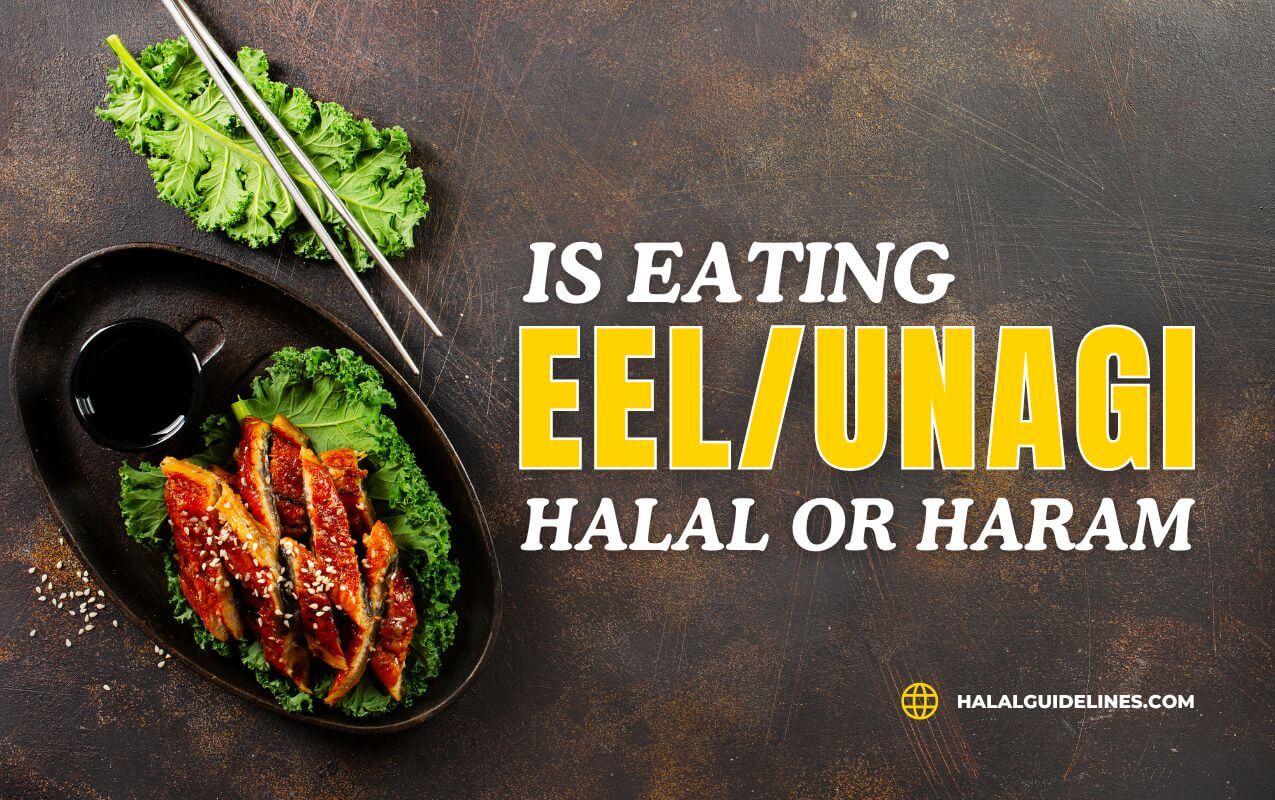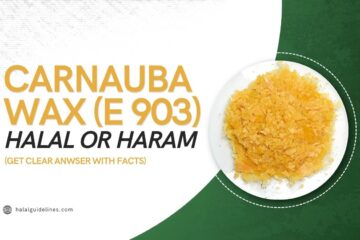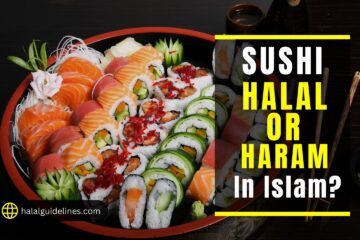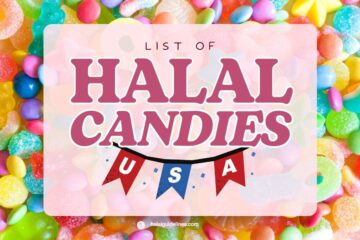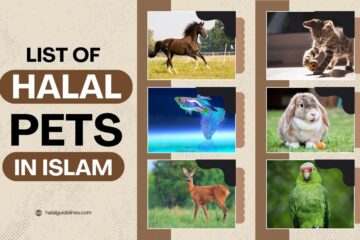This means making sure the eel is cooked properly and using ingredients that are considered halal. By doing this, Muslims can enjoy eel while staying in line with Islamic dietary guidelines.
Quran’s Teachings about Marine Life (With Verse)
The Quran teaches us that marine life is a blessing from Allah and a source of sustenance for humans. It highlights the importance of sea creatures and the benefits they provide to mankind.
In Surah An-Nahl (16:14), it says:
وَهُوَ ٱلَّذِى سَخَّرَ ٱلْبَحْرَ لِتَأْكُلُوا۟ مِنْهُ لَحْمًۭا طَرِيًّۭا وَتَسْتَخْرِجُوا۟ مِنْهُ حِلْيَةًۭ تَلْبَسُونَهَا وَتَرَى ٱلْفُلْكَ مَوَاخِرَ فِيهِ وَلِتَبْتَغُوا۟ مِن فَضْلِهِۦ وَلَعَلَّكُمْ تَشْكُرُونَ
Meaning: And it is He who subjected the sea for you to eat from it tender meat and to extract from it ornaments which you wear. And you see the ships plowing through it, and [He subjected it] that you may seek of His bounty; and perhaps you will be grateful.
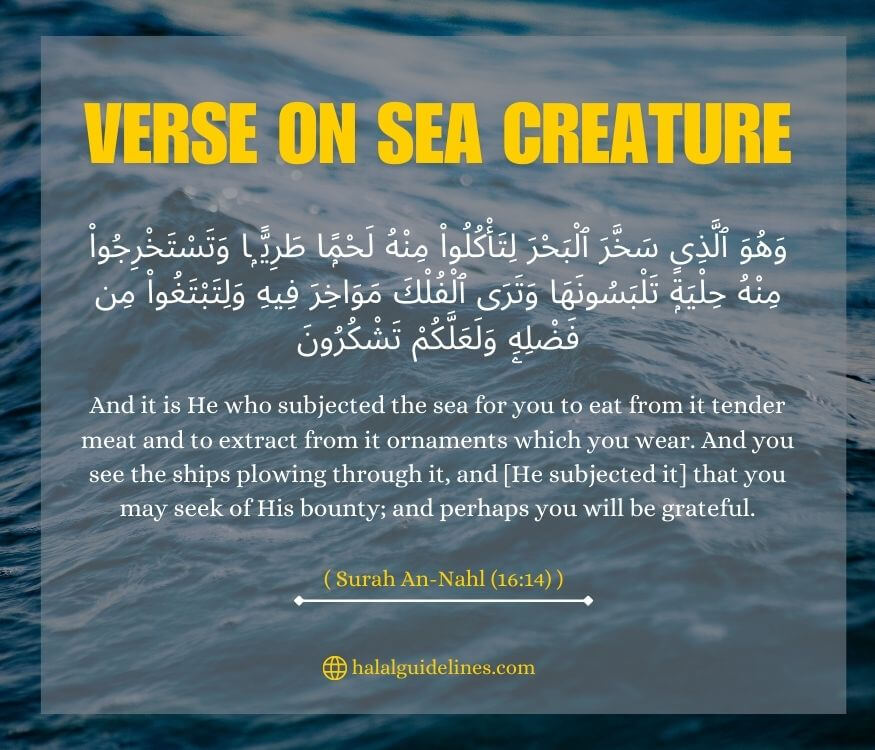
This verse shows that Allah has made the sea and its creatures useful for humans. We can eat fresh seafood, find precious items like pearls, and use the sea for travel and trade. It reminds us to be thankful for these blessings from the sea.
More interesting articles suggested for you:
Islamic Scholars Views on Eating Sea Animals
Eating sea creatures is an important topic for us as Muslims who want to follow their faith’s dietary rules. The Quran gives guidance on what you can eat all creatures from the sea because it is halal, and Islamic scholars have studied these teachings to help Muslims know what is allowed. This is especially important for Muslims living in coastal areas where seafood is a big part of their diet.
Here are the most famous Islamic Scholar and their guidance on this topic:
For this reason, sea animals are generally considered halal regardless of their diet. Sheikh Assim also references a story from Sahih al-Bukhari where the companions of the Prophet ate a dead whale they found on the beach, showing that whales were consumed during the Prophet’s time.
You can confirm his wording in the video below:
Dr. Zakir Naik explains that generally, seafood is allowed for Muslims, except for those that are specifically prohibited, such as poisonous sea creatures. He confirms that fish, prawns, lobsters, and crabs are permissible to eat unless otherwise stated in the Quran.
See his video below:
He talks about different beliefs regarding seafood. Some Muslims believe that predator fish such as sharks are forbidden (haram), but this isn’t agreed upon by everyone. There’s also a misunderstanding that crustaceans like crabs are haram, but he explains that most scholars consider them halal.
He mentions Hadiths that support the idea that seafood is allowed, even mentioning instances where dead fish washed ashore. According to him the Prophet Muhammad’s actions in such cases confirm that these foods are permissible (halal).
You can watch his video below:
Islamic scholars agree that most sea creatures, including fish like eels, are allowed (halal) to eat unless there’s a clear reason not to from the Quran or Hadith. Muslims can enjoy seafood like eels, keeping in mind the teachings that promote good health and well-being.
Healthy Halal Eel Cooking Methods According to Islam
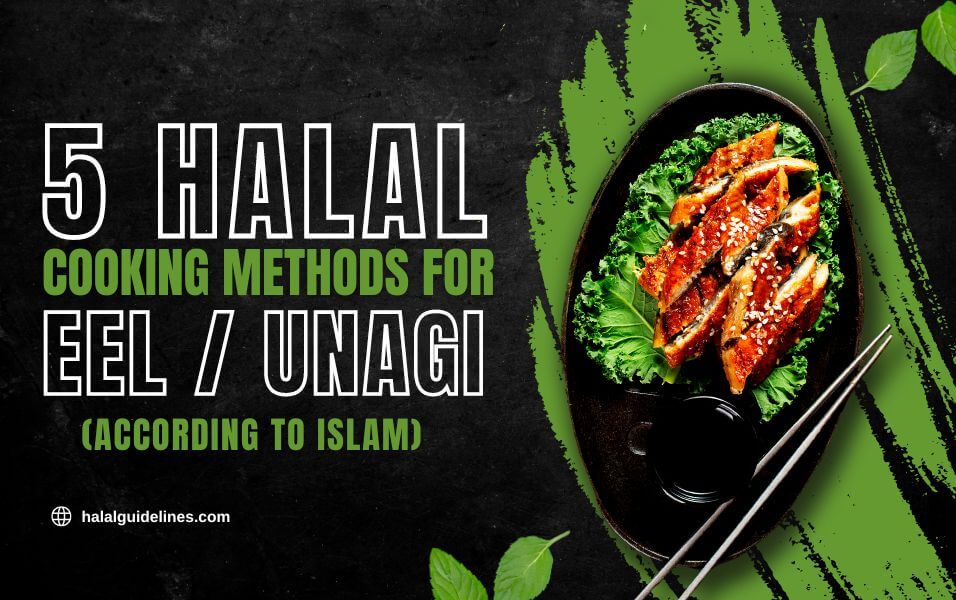
Cooking eel in a healthy, halal way is important for Muslims who want to enjoy this seafood while following Islamic guidelines.
Here are some methods that are both healthy and halal:
1. Grilling Process
This is a great way to cook eel without using much oil. First, clean the eel well and take off the skin and bones. Then, mix it with halal spices like crushed garlic, lemon juice, and fresh herbs. Put the eel on a clean grill over medium heat. Cook it until it’s done all the way through, turning it once or twice.
2. Steaming Process
Steaming keeps all the good nutrients in the eel and doesn’t need any extra fat. Cut the clean eel into big chunks. Put these pieces in a steamer basket. Sprinkle on some salt, pepper, and maybe some lemon zest. Steam the eel until you can easily break it apart with a fork. This usually takes about 10-15 minutes.
3. Baking Process
Turn your oven on to 375°F (190°C). While it’s heating up, put the clean eel in a baking dish. You can add thin slices of lemon and some fresh herbs like parsley on top. Bake the eel for about 20-25 minutes. You’ll know it’s done when it flakes easily and looks opaque.
4. Broiling Process
Set your oven to broil. Put the eel pieces on a pan that can go under the broiler. Season the eel with a bit of olive oil, salt, and pepper. Cook it for about 5 to 7 minutes on each side of the eel. Keep looking at it so it doesn’t burn.
5. Poaching Process
Fill a pot with water and bring it to a gentle simmer – you should see small bubbles, but the water shouldn’t be boiling hard. Add some whole peppercorns and a bay leaf to the water for flavor. Gently put the eel pieces into the water. Let them cook for about 8-10 minutes until they’re soft and fully cooked.
Remember, to keep eel halal:
- Buy it from a trusted halal source
- Clean it thoroughly
- Don’t use any haram (not allowed) ingredients like alcohol in your cooking
- Use separate utensils and cooking areas if you also cook non-halal foods
These cooking methods are great because they bring out the natural taste of the eel without adding unhealthy fats or anything that’s not allowed in Islam. They’re also pretty simple, so even if you’re not an expert cook, you can still make a tasty, halal eel dish!
More Related FAQs
Do eels need to be slaughtered in a special way?
Unlike land animals, sea creatures like eels don’t require ritual slaughter (zabiha). According to most Islamic scholars, the act of removing them from the water is sufficient. It’s recommended to kill them quickly and humanely.
Can Muslims eat all types of eels?
While most eels are halal, Muslims should avoid any species known to be poisonous or harmful to health. Islam highlights preserving one’s health, so it’s important to consume only those eels that are safe and nutritious.
Is eel skin halal to eat?
Yes, eel skin is halal if the eel itself is halal and properly prepared. Eel skin is often considered a delicacy in some cuisines. So be ensured it’s cleaned thoroughly before cooking and eating.
Are there any conditions when the eel becomes haram?
The eel can become haram if it’s prepared with any forbidden ingredients like alcohol or pork products. If an eel has become toxic due to environmental pollution or if consuming it poses a clear health risk, it would be considered haram as Islam prohibits consuming anything harmful.
Final Thoughts
The Quran teaches us that sea animals are a blessing from Allah for Muslims to enjoy. They remind us of Allah’s kindness and wisdom in creating the oceans and the creatures within them. Islamic scholars also remind us that Allah guides us to avoid sea creatures that can harm us or make us sick.
Our bodies are a gift from Allah, and it’s our duty to take care of them. When we enjoy seafood, we should think about whether it’s allowed and whether it’s good for our health. We should always choose what’s best for our faith and well-being.
May Allah Always keep his blessing on us throughout our lives and keep us away from the haram things or food.

